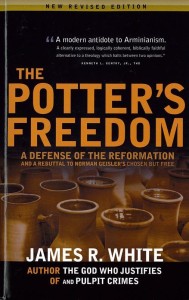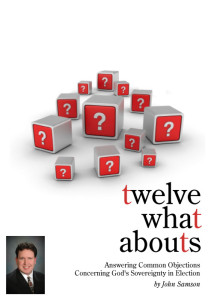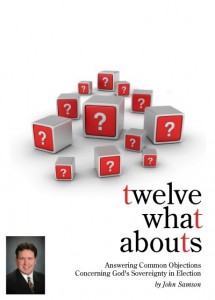 It was the visit to Scottsdale of Dr. Sproul in the year 2000 and Dr. James White’s book “The Potter’s Freedom” that were the two major means God used to turn me from a word of faith pastor into…. slowly but surely… over time… a Reformed Baptist pastor subscribing to the 1689 London Baptist Confession. A third means would be the vast theological resources of sermons and essays at monergism.com, a site hosted by John Hendryx.
It was the visit to Scottsdale of Dr. Sproul in the year 2000 and Dr. James White’s book “The Potter’s Freedom” that were the two major means God used to turn me from a word of faith pastor into…. slowly but surely… over time… a Reformed Baptist pastor subscribing to the 1689 London Baptist Confession. A third means would be the vast theological resources of sermons and essays at monergism.com, a site hosted by John Hendryx.
Concerning ‘The Potter’s Freedom’ book, Dr. White writes:
I am certain Norman Geisler had no intentions, upon completing Chosen But Free, of seeing entire churches founded upon the Reformed faith as a result of his book. In fact, just the opposite was his desire. We had discussed his forthcoming book on a ride to the airport in Indianapolis in 1999. As I listened to him discuss “extreme Calvinism” I immediately recognized he was simply talking about Calvinism itself. I offered to send him my book, naively. He had just explained to me that he did not think anyone less than 65 should write a Systematic Theology, and to this day, as those who know him know, he does not believe he can learn from anyone younger than himself (a sort of reverse age-discrimination thing). I did send my books (at that time I had two little books on Calvinism out, God’s Sovereign Grace, and Drawn by the Father), but I know they were never read.
Like many of my books back then, TPF was written in a relatively short amount of time. These days it takes me forever, but back then I wasn’t traveling globally, so I had more time to write, and more focus as well. One of the real issues in dealing with the book was that the first edition did not have a meaningful Scripture index. One of the editors (it was published by my own publisher, Bethany House, so I had some inside insight into it) told me that they wanted a complete index, but it ran into a page limit issue, so the original Scripture index was extremely meagre. As a result, I used the ?#?prosapologian? chat channel to help. I would pay guys, like MarkE22, in Amazon gift cards of $10 or $15 to scan through the entire book and provide a page list of every reference to John 6:37, for example.
I look back now and smile at what I was thinking at the time. “Geisler’s book will create such confusion in people’s minds! He has amazingly chosen to redefine all the classic terminology, which will cripple people in their understanding of the historic discussion of this vital issue.” It really was my entire intention to address that problem, showing all due respect to Dr. Geisler. And though he has been anything but kind to me in the years since that book came out (I was informed only two days ago about a letter he wrote ripping into me, all in defense of—guess who? Yeah, Ergun Caner), I am very thankful that any semi-fair reader will be able to verify the respectfulness of the book with reference to Geisler.
As I said above, I doubt Geisler realized how wide the impact of his book would be—in the reverse direction of his intentions. I know of one church that was founded because of TPF—have lost count of the number of people who have found places of ministry, or even entered into the ministry, at least partly due to that work. I surely had no idea how the book would be received or how widely it would be read.


 An author writes in hope of being read and that his readership would be helped by the things he has written. I just took a look at the reviews of my book on amazon.com John Samson, is the pastor of King’s Church in Phoenix, Arizona.
An author writes in hope of being read and that his readership would be helped by the things he has written. I just took a look at the reviews of my book on amazon.com John Samson, is the pastor of King’s Church in Phoenix, Arizona.